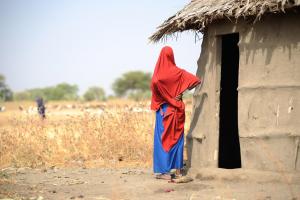Rooting out female genital mutilation in Tanzania
Dar es Salaam – Efforts to end female genital mutilation are gradually bearing fruit in Tanzania. The prevalence of the ritual that marks a rite of passage among some communities has now fallen to around 10% from 18% in 1996.
An increasing number of girls are attending alternative rites of passage and more cases are being reported and handled by the police thanks to campaigns by activists and non-governmental organizations.
Tanzania criminalized female genital mutilation in 1998. The country has also adopted a National Plan of Action to end Violence against Women and Children and is committed to ending violence against women and children in all its forms, including female genital mutilation, by 2030.
“We have worked alongside influential community leaders, lobbied elected officials, arrested perpetrators and collaborated with converted circumcisers to organize rite of passage festivals without the female cut,” says Getrude Shinje Dyabene an officer at Legal and Human Right Centre and the National Coordinator of the Coalition Against Female Genital Mutilation.
However, the practice persists in Arusha, Dodoma, Manyara, Mara, Singida regions which have higher prevalence. One in 10 women in Tanzania has been circumcised.
While official data depict a decrease in the practice, it has been handed down from generation to generation, keeping it alive despite the endeavours to root it out.
“As we lobby elected officials, they pressure them [community leaders] to end FGM [female genital mutilation] or risk losing elections,” says Koshuma Mtengeti, a Programme Officer at Children Dignity Forum that promotes reproductive health rights.
In some instances, community leaders pretend to abandon the practice then organize alternative rite of passage festivals for girls only to continue with female genital mutilation in disguise.
Perpetrators are increasingly targeting children below one year, which represent 35% of women that have undergone female genital mutilation in Tanzania.
“FGM is more than traditional practice. Its supporters hold to it religiously. It is linked to dignity, status in one side and on the other it is an economic activity enforced by individuals that have clout in households and in the community,” Dyabene says.
Nine in 10 women in Tanzania believe that female circumcision should be stopped. “Women should be empowered to put their belief in practice,” she points out.
To reach out to the 2030 target, information on the medical and social consequences of female circumcision needs to be provided in the health worker curriculums and on-the-job training programmes. This will raise awareness of health care workers and help manage and prevent FGM.
The World Health Organization is supporting Tanzania’s Ministry of Health to review the nursing and midwives training curriculum and prepare a competency-based module on female genital mutilation to help end the practice.
To eliminate female circumcision, health and rights activists call for a firmer resolve by elected officials to support law enforcement and step up advocacy.
“We keep campaigning that circumcision is both psychologically and biologically detrimental. Our arguments must address the counter-arguments that perpetuate female circumcision with economic, religious and psychological incentives,” says Mtengeti.
Communications and Media Officer
WHO Country Office, United Republic of Tanzania
Tel:+255 22 2111718/2113005
Mobile:+255 743 958599
Email: mwijarubim [at] who.int
National Program Officer RMNCAH-FHP
WHO Country Office, United Republic of Tanzania,
Tel:+255 (22) 2113005/2111718
Mobile: +255 754 375200
Email: swaie [at] who.int
Technical Officer,
Sexual and Reproductive Health and Rights
WHO Regional Office for Africa, IST for East and Southern Africa
Tel. +47 241 38407
Email: elaminha [at] who.int
Technical Officer - Communication
Sexual and Reproductive Health and Rights
Tel: +(47 241) 39571/+242 05 771 4301
Email: asekpon [at] who.int
Senior Editor/Writer
Email: ottob [at] who.int
Communications and marketing officer
Tel: + 242 06 520 65 65 (WhatsApp)
Email: boakyeagyemangc [at] who.int



